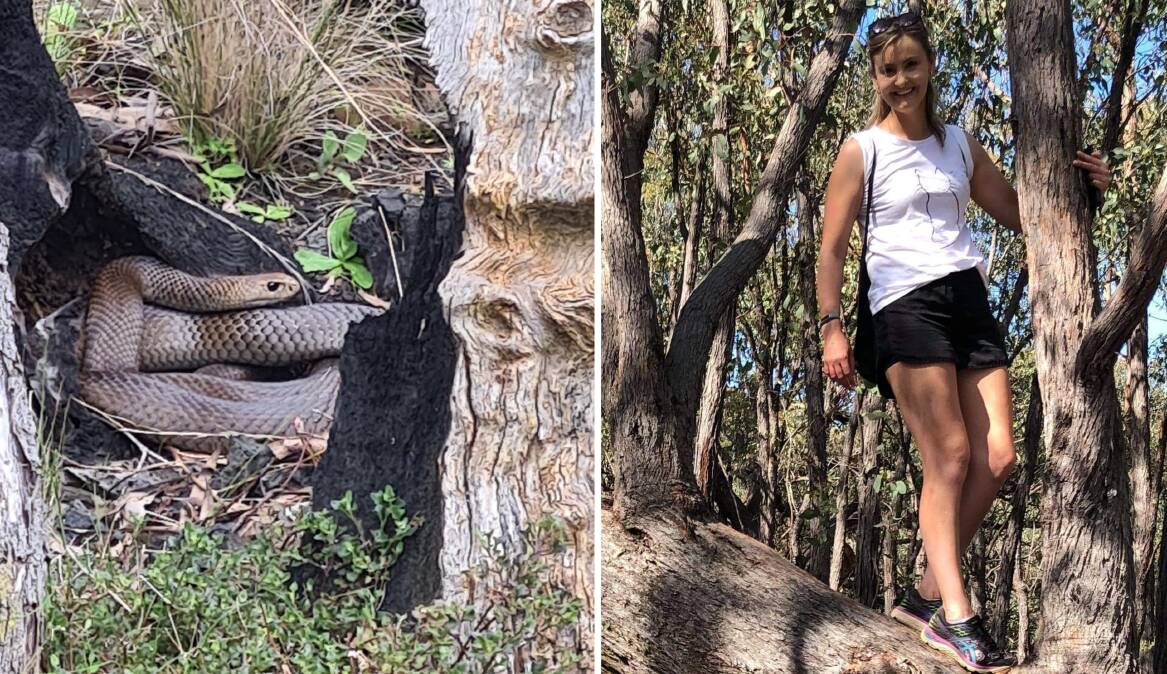Spring has brought the brown snakes back. Catcher Gavin Smith caught one which emerged from under a driveway in Gordon.
It was spotted going into the crack on the edge of the drive so he put a camera there and filmed it emerging before catching it to release it later in safety - for it and humans.
Earlier, runner Jess Forde came across one on Mount Ainslie. Overawed by its beauty, she reversed her brisk walk-away to return and take a picture of it.
"He was just soaking up the sun," she said. "It was nice to see him - but it was nice to move on, too."

She was taking part in a pastime called "geocaching" where small items (like plastic food containers) are hidden in the bush. Participators are given the coordinates and have to find the item - only, in this case, the brown snake had found the item first.
The snakes are not yet at their liveliest and that presents risks for humans. "At this time of year, when temperatures and weather conditions fluctuate a fair bit and snakes are re-emerging after winter dormancy, I find brown snakes to be not always as alert and agile as they become later into spring," Dr Smith said.
"This means it is much easier to either startle or actually tread on one if people start straying off paths into denser vegetation." He recommended keeping dogs under control, too.
But despite the appearance of brown snakes in the warmth of recent days, Canberra's snake catchers have not been as busy as in the past, perhaps because of the wet.
One theory is that the rain has caused lush grass and other vegetation around Canberra. That abundant greenery outside built-up areas has been good for rodents and lizards so snakes have stayed away from the streets to feed better in the bush.

"There's more rain so mice will be thriving so there will be little reason for snakes to come into the city," Alex Borg of Canberra Snake Catchers said.
He's been one of the fans of snakes taking part in an ANU research project led by Dr Smith who, by the way, rescued a brown snake which had got its head stuck in a can of Coke in March.
The Canberra Snake Tracking Project involves cameras outside burrows used by eastern brown snakes. Snakes are also tagged electronically and tracked.
The aim is to understand their behaviour in an urban environment. How do they cope when they are caught released into the bush, for example.
The researchers have discovered that eastern brown snakes often share sinter burrows with animals which they would normally eat.
Alex Borg's theory is that the snakes get warmth from the mammals which act like mini-heaters. The snakes know a good thing when it makes them warmer so they curb their enthusiasm for a bite.
"Mammals will generate some heat, so maybe the snakes are keeping them around because while those mammals are in there and they're hugging each other and shivering together and they're generating that heat, it's warming up that burrow to an optimum temperature," Alex Borg said.
"Or it could because they are in such a torpor that they aren't hungry so they live and let live."
He and Alex Borg both spread the message that snakes are not to be killed on finding. When the catchers are called to catch one, they take it and release it somewhere safe.
- Gavin Smith and Ngunnawal custodian Richie Allan are giving a talk at the ANU on September 29. The title is: "Why are snakes important?" Tickets and details can be obtained at: https://www.eventbrite.com.au/e/seeing-snakes-differently-a-ngunnawal-and-socio-ecological-perspective-tickets-409730162947






